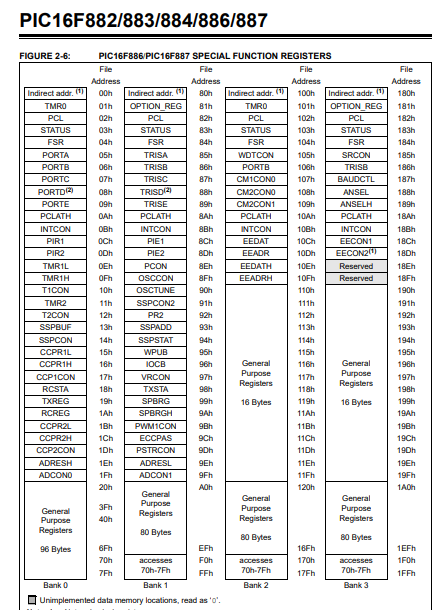Hello,
I am quite new to C programming and Microchip programming in general but I did something for a personal project however I am not sure what and if I am doing something wrong.
I am trying to read the voltage from 6 thermocouples and eventually convert it into actual temperature units in order to control a relay. Now I want to mention that I want to achieve a good precision, perhaps 0.1 degreess or better if possible.
For that, I am using really precise J type thermocouples. The thermoelectric voltage in milivolts for these thermocouples is for example, 27.5mV at 500C. At 20C, it is just 1.2mV.
I worked on this project for a bit, in order to get these voltages but I am not sure what I am doing wrong. I am using the PIC16F887 because I feel like this can be done on this MCU and because it is widely available.
Project is in MPLAB and XC8 compiler.
/**************************************************************************************
Thermocouple reading.
***************************************************************************************/
#define _XTAL_FREQ 16000000
#include <stdint.h>
#include "CONFIG.h"
void Initialise_Analogue_Pins(){
ANSELbits.ANS1 = 1;
ANSELbits.ANS2 = 1;
ANSELbits.ANS3 = 1;
ANSELbits.ANS4 = 1;
ANSELbits.ANS5 = 1;
ANSELbits.ANS6 = 1;
}
int Upper_Zone_1(){
ADCON0bits.CHS = 0b0001; // Select AN1.
ADCON1bits.ADFM = 1;
ADCON0bits.ADON = 1;
PIE2bits.C1IE = 0;
PIR2bits.C1IF = 0;
__delay_ms(50);
while(ADCON0bits.GO_DONE);
return((ADRESH<<8) + ADRESL);
}
int Upper_Zone_2(){
ADCON0bits.CHS = 0b0010; // Select AN2.
ADCON1bits.ADFM = 1;
ADCON0bits.ADON = 1;
PIE2bits.C1IE = 0;
PIR2bits.C1IF = 0;
__delay_ms(50);
while(ADCON0bits.GO_DONE == 1);
return((ADRESH<<8) + ADRESL);
}
int Upper_Zone_3(){
ADCON0bits.CHS = 0b0011; // Select AN3.
ADCON1bits.ADFM = 1;
ADCON0bits.ADON = 1;
PIE2bits.C1IE = 0;
PIR2bits.C1IF = 0;
__delay_ms(50);
while(ADCON0bits.GO_DONE == 1);
return((ADRESH<<8) + ADRESL);
}
int Upper_Zone_4(){
ADCON0bits.CHS = 0b0100; // Select AN4.
ADCON1bits.ADFM = 1;
ADCON0bits.ADON = 1;
PIE2bits.C1IE = 0;
PIR2bits.C1IF = 0;
__delay_ms(50);
while(ADCON0bits.GO_DONE == 1);
return((ADRESH<<8) + ADRESL);
}
int Upper_Zone_5(){
ADCON0bits.CHS = 0b0101; // Select AN5.
ADCON1bits.ADFM = 1;
ADCON0bits.ADON = 1;
PIE2bits.C1IE = 0;
PIR2bits.C1IF = 0;
__delay_ms(50);
while(ADCON0bits.GO_DONE == 1);
return((ADRESH<<8) + ADRESL);
}
int Upper_Zone_6(){
ADCON0bits.CHS = 0b0110; // Select AN6.
ADCON1bits.ADFM = 1;
ADCON0bits.ADON = 1;
PIE2bits.C1IE = 0;
PIR2bits.C1IF = 0;
__delay_ms(50);
while(ADCON0bits.GO_DONE == 1);
return((ADRESH<<8) + ADRESL);
}
// Main function
void main() {
int Upper_Zone_1_Temp, Upper_Zone_2_Temp, Upper_Zone_3_Temp, Upper_Zone_4_Temp, Upper_Zone_5_Temp, Upper_Zone_6_Temp;
Initialise_Analogue_Pins(); // Initialise analogue pins.
//INTCON = 0xC0; // Enable global and peripheral interrupts
while(1) {
Upper_Zone_1_Temp = Upper_Zone_1();
//Upper_Zone_2_Temp = Upper_Zone_2();
//Upper_Zone_3_Temp = Upper_Zone_3();
//Upper_Zone_4_Temp = Upper_Zone_4();
//Upper_Zone_5_Temp = Upper_Zone_5();
//Upper_Zone_6_Temp = Upper_Zone_6();
}
}Here is the header file:
#ifndef XC_HEADER_TEMPLATE_H #define XC_HEADER_TEMPLATE_H // PIC16F887 Configuration Bit Settings // 'C' source line config statements // CONFIG1 #pragma config FOSC = HS // Oscillator Selection bits (HS oscillator: High-speed crystal/resonator on RA6/OSC2/CLKOUT and RA7/OSC1/CLKIN) #pragma config WDTE = OFF // Watchdog Timer Enable bit (WDT disabled and can be enabled by SWDTEN bit of the WDTCON register) #pragma config PWRTE = ON // Power-up Timer Enable bit (PWRT disabled) #pragma config MCLRE = ON // RE3/MCLR pin function select bit (RE3/MCLR pin function is MCLR) #pragma config CP = OFF // Code Protection bit (Program memory code protection is enabled) #pragma config CPD = OFF // Data Code Protection bit (Data memory code protection is enabled) #pragma config BOREN = ON // Brown Out Reset Selection bits (BOR enabled) #pragma config IESO = OFF // Internal External Switchover bit (Internal/External Switchover mode is enabled) #pragma config FCMEN = OFF // Fail-Safe Clock Monitor Enabled bit (Fail-Safe Clock Monitor is enabled) #pragma config LVP = OFF // Low Voltage Programming Enable bit (RB3/PGM pin has PGM function, low voltage programming enabled) // CONFIG2 #pragma config BOR4V = BOR40V // Brown-out Reset Selection bit (Brown-out Reset set to 4.0V) #pragma config WRT = OFF // Flash Program Memory Self Write Enable bits (Write protection off) // #pragma config statements should precede project file includes. // Use project enums instead of #define for ON and OFF. #include <xc.h> #endif /* XC_HEADER_TEMPLATE_H */




